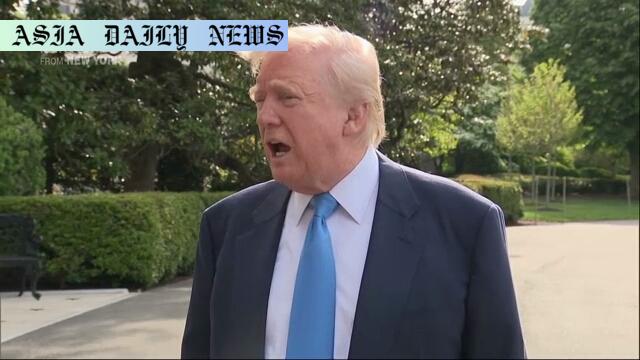Trump-Xi Phone Call: US President Donald Trump claims he spoke with China’s Xi Jinping directly; China denies the conversation occurred.
Trump claims he had a direct phone conversation with China’s Xi Jinping.
China denies the call ever took place, creating controversy.
Trump provided vague remarks about the details of the discussion.
China emphasized its opposition to unilateral pressure and readiness for responses to US tariffs.

Trump’s Controversial Statement on Speaking with Xi Jinping
In a surprising twist during an interview with Time magazine, US President Donald Trump claimed that he had spoken on the phone directly with China’s President Xi Jinping. Trump, known for his candid and often contentious statements, suggested that the phone call involved talks surrounding making potential deals. However, the controversy lies not in the call’s content—which he did not elaborate on—but in whether the call even happened. Chinese officials, including the Foreign Ministry spokesperson Guo Jiakun, have firmly denied that such a conversation occurred. This apparent contradiction has ignited global discussions, especially amid rising tensions between the two economic giants.
China’s Firm Denial and Strategic Position
The Chinese government promptly debunked Trump’s claims about the phone call. Spokesperson Guo Jiakun stated, “China and the US are not having consultations or negotiations on tariffs,” categorically rejecting Trump’s statement as a misunderstanding or deliberate misstatement. Instead, China appears to be preparing its own countermeasures in response to the escalating tariff measures announced by Trump earlier this month. President Xi Jinping, demonstrating strong leadership, chaired a party meeting focusing on agricultural production and the nation’s stance against unilateral pressure. His commitments to multilateralism were underscored, aligning with views shared by many global leaders wary of a US-China trade war.
What Does This Controversy Reveal?
The claim by President Trump has invited sharp scrutiny, not only because of its timing—as it follows his announcement of increased tariffs—but also because of his vagueness. Critics argue that such statements could undermine diplomatic relations if they are later proven to be untrue. Meanwhile, the lack of details provided by Trump adds fuel to speculations about his motive for making the claim. Was it an attempt to assert dominance or show optimism about resolving trade disputes? Either way, the ensuing confusion benefits no one. It raises doubts about trustworthiness while exacerbating already fraught US-China relations.
Implications for Global Trade and Politics
The backdrop for this controversy involves the ongoing trade tension between the US and China. Trump’s administration has criticized China’s trade practices, imposing tariffs aimed at protecting American interests. China, in turn, has pushed back, signaling its ability to mobilize economically and diplomatically in countermeasures. If Trump’s claim about speaking with Xi Jinping was meant as a sign of possible reconciliation, it backfired because China’s denial amplifies skepticism around America’s consistency and intentions. For global trade, it adds another layer of unpredictability, affecting not only bilateral relations but also world markets increasingly sensitive to economic policy shifts.
The Importance of Communication Transparency
Incidents like these highlight the critical role of transparency in international diplomacy. World leaders are expected to communicate candidly and responsibly to avoid exacerbating existing tensions. Trump’s remarks, paired with the Chinese government’s firm denial, expose the risks of poor communication. For the global community witnessing this unfolding drama, it reinforces the importance of comprehensive public information and diplomatic clarity. In times of economic uncertainty, mixed messages are more harmful than ever, threatening both political stability and public trust.



Commentary
Examining the Trump-Xi Phone Call Controversy
The unfolding dispute between US President Donald Trump and Chinese officials over an alleged phone conversation with President Xi Jinping is yet another example of how geopolitics often veers into the realm of uncertainty. At its heart, this controversy showcases the significance of accountability and clear communication in maintaining trust—both domestically and internationally. Trump’s claim, juxtaposed against firm denials from Beijing, puts into question the reliability of unverified diplomatic statements.
The Impact on US-China Relations
US-China relations were already under immense pressure, with the trade war affecting not just economic policies but also political rapprochement. The ambiguity surrounding Trump’s statements does little to ease these tensions. Instead, it risks further entrenching distrust between the two nations. While both countries have much to gain from negotiation and dialogue, this episode illustrates how perceived inconsistencies and miscommunication can derail progress. China’s quick rebuttal appears to reflect its strategic approach to avoid painting themselves as passive participants at the mercy of American claims.
The Broader Context of Political Rhetoric
Trump’s remarks are emblematic of a broader trend of using rhetoric as a tool of political maneuvering. Whether intentional or not, statements like these influence public perception and shape international narratives. For observers, the controversy is a reminder to critically analyze political messaging, especially when details are deliberately omitted or obscured. In an age of rapid information exchange, transparency remains paramount in fostering trust and understanding among nations.